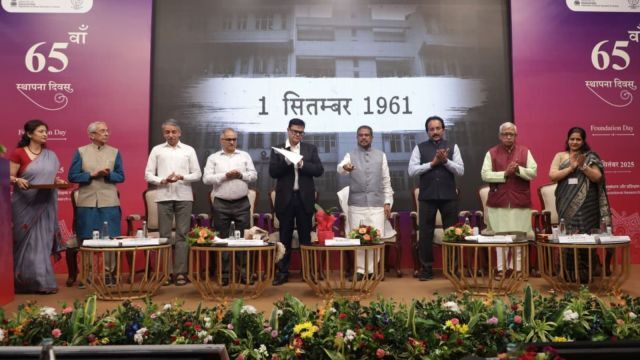NCERT launches Bal Vatika TV and DIKSHA 2.0, pushes digital and inclusive learning on 65th anniversary
By | Education | 02-Sep-2025 11:35:23

News Story
The National Council of Educational Research and Training (NCERT) marked its
65th foundation day on September 1 with a sweeping set of new initiatives to
transform school education in India—ranging from a dedicated TV channel for
preschoolers to AI-powered learning platforms and inclusive tools for children
with disabilities.
Union Education Minister Dharmendra Pradhan,
who presided as chief guest, unveiled the Bal
Vatika – PM eVidya DTH Channel No. 35, designed to deliver engaging
audio-visual content for children aged 3–6 years. The channel will also support
teachers, Anganwadi workers and parents in building strong foundational
literacy and numeracy skills.
A major highlight was the launch of DIKSHA 2.0, an upgraded learning
platform featuring structured lessons, adaptive assessments, performance
feedback and cutting-edge AI tools such as Read Aloud, Closed Captioning and
multilingual translation in 12 Indian languages.
Other announcements underscored NCERT’s pivot
toward inclusivity and innovation. These included:
·
PRASHAST
2.0, an integrated screening tool for early detection of disabilities,
linked with UDISE+, APAAR and the Swavlamban Card.
·
Kitab Ek
Padhe Anek, a universal design initiative to create accessible
textbooks for diverse learners.
·
Release of primers in Hindi, Sanskrit, Ho-Hindi
and Koya languages.
·
Launch of the PM eVidya mobile app as a centralized digital learning
gateway.
·
Establishment of VR labs in four demonstration schools.
·
Publication of Utkal
Jananinkara Sujogya Santana, chronicling 100 pioneering
personalities from Odisha.
The council also inaugurated its new entrance
complex on Aurobindo Marg and reinforced the National Education Policy (NEP)
2020’s emphasis on vocational training, with the PSSCIVE rolling out a handbook
for key functionaries.
Commemorating five years of NEP 2020, NCERT
highlighted its role in shaping India’s curriculum reforms through the National Curriculum Framework for School
Education (NCF-SE 2023) and the Foundational
Stage Framework (NCF-FS 2022).
Pradhan urged NCERT to continue driving innovation in pedagogy and digital education, stressing that strengthening foundational learning and inclusivity is “central to building a future-ready India.”